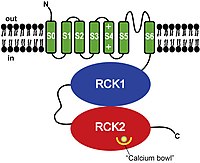
Photo from wikipedia
Hydrogen sulphide (H2S) is the latest identified small gaseous mediator enabled by its lipophilic nature to freely permeate the biological membranes. Initially, H2S was recognized by its roles in neuronal… Click to show full abstract
Hydrogen sulphide (H2S) is the latest identified small gaseous mediator enabled by its lipophilic nature to freely permeate the biological membranes. Initially, H2S was recognized by its roles in neuronal activity and vascular relaxation, which makes it an important molecule involved in paracrine signalling pathways. Recently, the immune regulatory function of gasotransmitters, H2S in particular, is increasingly being appreciated. Endogenous H2S level has been linked to macrophage activation, polarization and inflammasome formation. Mechanistically, H2S‐induced protein S‐sulphydration suppresses several inflammatory pathways including NF‐κB and JNK signalling. Moreover, H2S serves as a potent cellular redox regulator to modulate epigenetic alterations and to promote mitochondrial biogenesis in macrophages. Here in this review, we intend to summarize the recent advancements of H2S studies in macrophages, and to discuss with focus on the therapeutic potential of H2S donors by targeting macrophages. The feasibility of H2S signalling component as a macrophage biomarker under disease conditions would be also discussed.
Journal Title: Immunology
Year Published: 2020
Link to full text (if available)
Share on Social Media: Sign Up to like & get
recommendations!